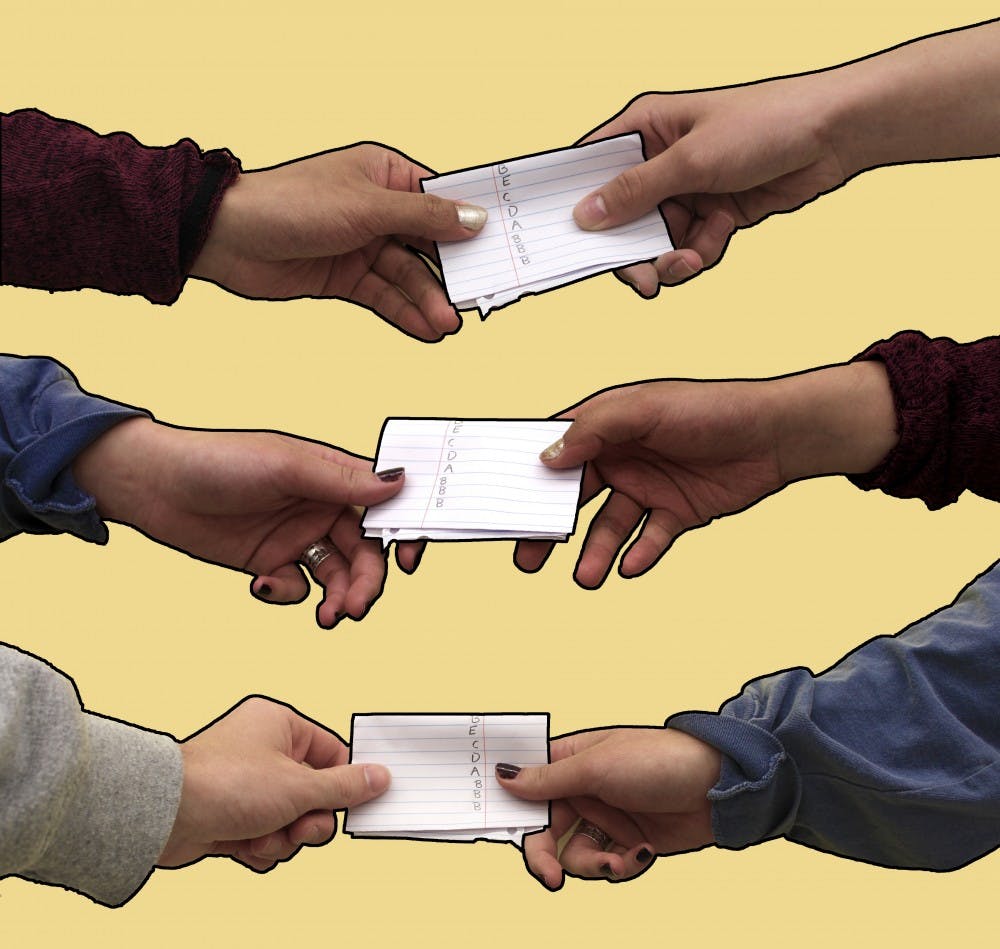By Mary Schrott, For The Miami Student
First the end seats were taken, followed by seats in the back. Picking their spots wisely, students trickled into the classroom accompanied by the sound of rustling notebooks.
While most were engrossed in reviewing material for the exam, sophomore Amy Shomo couldn't help but be distracted by the student sitting in front of her. He sat hunched over, while furiously scribbling notes onto his desk. As the professor entered the room he quickly covered the jottings with his arms. Once the tests were distributed he glanced from test to answer sheet, stealing peeks beneath the papers. With each additional glimpse, he filled his answer sheet with correct answers and Shomo was disgusted.
"He would just cheat," Shomo said. "Are you freaking kidding me? I was so mad. That's just annoying."
According to a poll conducted by CollegeHumor.com, nearly 61 percent of the 30,000 college students surveyed admitted to academic cheating. Yet, of those 61 percent, only 16 percent "feel bad" about it.
Brenda Quaye, Miami University's coordinator for academic integrity, said cheating is something that continues with an individual as a practice throughout their life.
"It's a habit of mind, it really is," Quaye said. "It's a habit of mind of taking short cuts, not paying attention, not spending the requisite time that's required and it continues to happen particularly if it's not stopped."
Quaye's office said that 258 cases of academic dishonesty were reported at Miami last school year and, of that number, 72 percent were found responsible of dishonesty.
If a professor suspects a student of academic dishonesty, Quaye said, the faculty member then must report the case to the department chair, which results in a "charge" against the student.
Once a charge is made, hearings occur that involve the student, members of the affected department and members of Quaye's department.
"We want those hearings to occur because we want students to get that education," Quaye said. "Even when they are fully admitting it, it's good to have the conversation so they are understanding the seriousness of the situation."
Within the three years Quaye has been working at Miami with students and cases of academic dishonesty, she said the approximate 70 percent rate of responsibility is not unusual.
Enjoy what you're reading?
Signup for our newsletter
She explained that because of the differing educations and cultures Miami students come in with, there is a learning curve.
Susan Finnerty, a Farmer School of Business professor, interacts with many first-year students through her Business 101 course and agreed there is a sense of ambiguity for underclassmen.
"In my class, one of the challenges is that I'm trying to teach critical thinking and most students that come in have learned the test," Finnerty said. "They've learned how to complete an exam."
Finnerty's introductory business course teaches students about ethical issues in business while exploring fundamental business processes. The course is required for business students and Finnerty expressed how important it is for first-years interested in business.
"It's a time when students are just starting to figure out [ethical decision making] and understand that these will be issues they will be dealing with," Finnerty said. "I don't think they come into business thinking that it's going to be an issue, they are thinking more 'I am just going to do my work.'"
This relationship between professor and student is a key component in how work is completed, Quaye explained.
"The student really wants to and needs to be told exactly what it is a faculty member expects and why," Quaye said. "There is really this gap between the intention and the perception of the faculty member and the student."
While Quaye cited a lack of communication between professor and student as factor to cheating, cultural values also play a role.
For Shomo, her lack of respect for cheating students stems from outside the classroom.
"I was raised in a household of following all the rules and always being obedient," Shomo said. "I am completely against cheating."
Shomo recalled that in grade school, she would confront her peers on cheating.
"I would be the kind of person if someone was like 'Hey, can I see your homework,' I told them 'No, do it yourself,'" Shomo said. "They would of course think I was lame because I wouldn't share my work with them."
Today, however, cheating has evolved from simply copying someone's homework, as more teaching is done online. Access to the Internet within an educational setting provides students with countless resources, many of which are not cited. To combat this plagiarism, many Miami professors use the Turnitin application on Niihka that cross-references student work with a database of online sources.
In addition to Turnitin, Quaye even noted that Miami is looking into piloting new online proctoring products. Some of the features of these new products include locking down browsers and video recording students taking online exams.
Stopping academic dishonesty early and indefinitely is something Quaye strives for.
"It's a little bit like speeding," Quaye said in reference to cheating. "You kind of slow down for a while if you're caught, but then you pick it back up a little more and start to speed more even if nobody's around."




